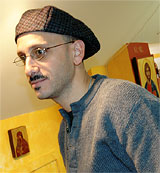 |
 |
|||||
 |
 |
 |
 |
 |
|||
 |
The artist in the attic benefits both art and parish
Artist in residence Inspiration from above By Michelle Martin The image of a lonely artist, isolated in an attic studio, creating masterpieces almost out of a vacuum, doesn’t fit Joseph Malham. Yes, Malham generally works by himself, and his studio is tucked into an attic. But it’s also the top floor of the St. Gregory the Great’s parish center, where Malham serves as an artist-in-residence. The low-slung space, painted a warm golden yellow, gets bright light from its dormer windows. Malham’s icons, those completed and in progress, line the walls. He settled onto a cushion to talk about the idea of being a kind of “parish artist,” something he wishes more parishes would consider. “It’s a mutually beneficial relationship, in which an artist is invited by the community to create sacred art,” said Malham. “In turn, they give back to the community. … It’s an entirely different understanding than it would be in the secular world, where you have an artist-in-residence or an author-in-residence come in and maybe teach or something like that.” Malham was invited to move his studio to St. Gregory by the pastor, Father Bart Winters, shortly after Winters arrived in 2000. He has worked on the restoration of the church and done other pieces for the parish, including a processional cross. He and iconographer Meltem Aktash are collaborating on a muraled chapel in what would have been one of the choir areas in the church, focusing on images of children in Scripture, for those who have lost children. While Malham gets paid for that work, the artist-in-residence relationship goes beyond a fee for services rendered. In fact, the way he and the parish have worked it out, no money changes hands. Malham uses the space on the top floor of the parish center for free; in turn, he provides an extra presence around the parish, keeping space that would have been vacant in use, offering an eye to design for parish publications and an extra hand when someone needs help. In addition to space, he gains membership in a worshipping community, a community that both informs and inspires the sacred images he creates. “Artists are orphans in the storm of society,” Malham said. “Sacred artists are even more divided from society because they’re not even speaking the same language.” Winters has encouraged the arts in all forms at the parish, which counts Father John P. Moulder, a well-known jazz guitarist and the archdiocesan liaison to the arts among its residents. The church often hosts concerts, and Malham used the parish for a book-signing of “By Fire Into Light: Four Catholic martyrs of the Nazi Camps” (Peeters, 2002). Such events foster an atmosphere that encourages creative expression. “There’s a sense or pride of ownership,” he said. “We’re here to serve the church, to be a presence, a creative spark.” Many parishes have unused space in convents and rectories that could be used by sacred artists, Malham believes. That opportunity might make it feasible for more artists to devote themselves to the work, instead of trying to hold down another job and doing art on the side. It also might remind parishes that they have an opportunity to commission unique works for the churches from local artists instead of ordering mass-produced pieces from catalogues. Unique artwork can provide a spiritual dimension to worship that nothing else can, Malham said. “We’ve lost a vital link of understanding how sacred images can transform not just a liturgical space, but the liturgy as well,” said Malham. “The percentage of sacred artists who are making a living at it is very small. Most are members of religious communities, or they do it as an avocation.” Part of the reason Malham can do it fulltime is the support he receives from St. Gregory the Great. “Economically, this has really allowed me to have a space to experiment and think and be creative,” Malham said. “This is my job. I barely get beyond paying my bills as it is, and without this, it would be a much more hardscrabble kind of existence. Spirtually, it’s a warm parish. Physically being next to the church—it’s a very prayerful, peaceful place to work.” |
||
|
|
|||